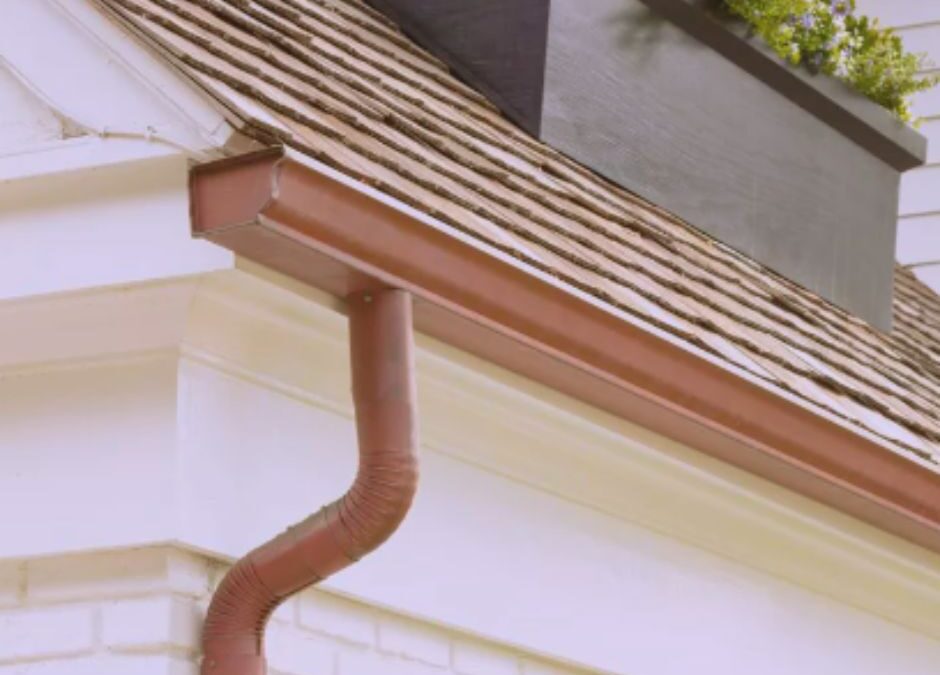Rain gutters shouldn’t be an afterthought. Our guide to gutters will help you choose the right style to keep your roof in good working order.
When designing and maintaining a home, gutters might seem like an afterthought. But they are integral to keeping water and snow away from your roof, attic, and foundation. Although they might seem like a small part of your house, they are vital for protecting its structure. Rain gutters protect the siding, roof, and foundation and help prevent water damage, such as flooding, corrosion, mold and mildew, and foundation settlement.
It can be a bit overwhelming to choose the best type of gutter for your home design and regional weather. Rain gutters come in different styles, and they can be built with a variety of materials. In order to pick the right gutter system for your home, it’s important to understand the different types of gutter available. Here’s everything you need to know to decide between the various gutter styles and materials.
Top Gutter Materials
Gutters made of vinyl and aluminum are the most popular materials, but today, galvanized steel, copper, and zinc are also options.
Vinyl Gutters
Made from polyvinyl chloride (PVC) plastic, vinyl gutters have a lifespan of 10 to 20 years. They are durable and easy to install. For people living in areas with extreme rainfall and wet weather, vinyl gutters are a practical and affordable choice. They can hold 20-50 times their weight in snow, ice, or rainwater.
Aluminum Gutters
Lightweight and rust-resistant, aluminum gutters can take a lot of wear and tear. However, they have a higher risk of cracking compared to other metal gutters. On average, aluminum gutters have a lifespan of 20 to 30 years. DIYers find them easy to install and well worth the value. Seamless aluminum gutters are optimal, but the preferred thickness (called “gauge”) varies depending on your climate.
Galvanized Steel
More durable compared to aluminum, galvanized steel gutters require professional installation because they need to be soldered. For houses in areas that experience heavy rainfall, galvanized steel gutters are the best option. It is important to keep up with the maintenance of these gutters because failure to properly maintain galvanized steel gutters may lead to rust. The average lifespan of galvanized steel gutters is 20 to 30 years.
Copper Gutters
Copper is extremely durable. Gutters made of copper will not bend or rust, even during extreme weather conditions. Copper gutters have a beautiful shine that ages well, but they can be quite expensive. That’s because they can last up to 60 years, which is sometimes longer than the roof itself.
Zinc Gutters
If you’re looking for gutters that will outlive you, zinc gutters are the way to go. They are low maintenance and rust-resistant. Zinc has a self-sealing patina that prevents scratches or cracks. On average, zinc gutters have a lifespan of 80 years. They’re also affordable.
Types of Gutters
Different types of gutters serve different functions. Based on your preferences, budget, and home design, gutters can add style in addition to maintaining your home.
Half-Round Gutters
These gutters have a semi-circular shape and a curved lip, which looks great on older and historic houses. Half-round gutters are more expensive because of the materials used to manufacture them. They have a smooth inner surface that is easy to clean away debris and leaves. Typically, half-round gutters are low maintenance, and they come in different sizes and widths.
K-Style Gutters
K-style gutters look like an indented cube with an open top. They have a flat back and an angular shape, which can accent a modern facade. They don’t need brackets and accessories for an easy installation, but K-style gutters are considered high maintenance. A gutter protection system will keep them from getting clogged. Most people choose 5-inch to 6-inch widths.
Custom Fascia Gutters
In comparison to K-style gutters, fascia gutters are a custom system built to fit your home’s measurements and roof pitch. Because they are custom, fascia gutters require professional installation and may cost more than off-the-shelf gutter options. Custom fascia gutters are seamless and built to suit your preferences; you choose the material, color, size, and width.
Box-Style Gutters
Box-style gutters are most common for commercial buildings because they are oversized; they come in 7-inch to 10-inch widths. They are best in regions with heavy downpours and for large roofs. These gutters are tucked under roof shingles, usually during the building construction process.
Tips for Gutter Maintenance
Gutters are fundamental to the integrity of the structure of your house, but the kind of gutters you get largely depends on the kind of roof your home has. To make maintenance easier, try a gutter guard and leaf catcher to avoid blockage. But also ensure your gutters are sized well for the pitch of the roof, as well as the amount of rainfall in your area. If you live in a wooded area, don’t forget seasonal gutter cleanings, which can help remove fallen leaves and identify cracks in the seams well before they pose a problem.
Matney Construction, located in Mount Airy, Maryland, specializes in building new homes and residential remodeling. We know that the decision to build or remodel a home is no easy thing. As a family owned and operated business, we work closely with our clients to create their dream home, from custom floor plans and options, to bath and kitchen remodels. Whether it’s a single room or an entire home, we pride ourselves on meeting your quality standards, timeline and budget. Contact us today to have our professional design experts help you make your home unique, stylish, and in-tune with your personality. (410) 635-2500 info@matneyservices.com

